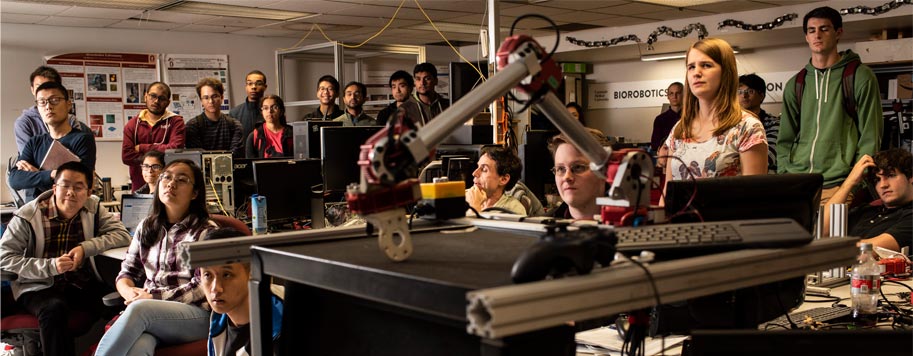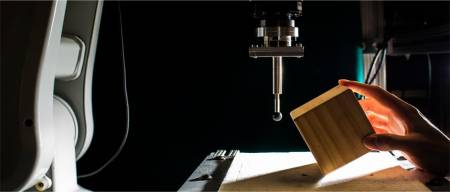About Us
Our Mission
WHY WE EXIST
The Robotics Institute at Carnegie Mellon University brings together the top scientific minds, intent on solving humanity’s toughest challenges through robotics. Encompassing the practical and the theoretical, we push the boundaries of collaboration to develop interdisciplinary solutions touching nearly every aspect of human life—making things safer, more efficient and more productive. We educate, mentor and empower the brightest and most ambitious roboticists to anticipate the future, and then to build the robotics we need to take us there.
Our Vision
WHAT WE ASPIRE TO BE
Since its founding, the Robotics Institute at Carnegie Mellon University continues to be the preeminent collaborative hub for the world’s visionaries in robotics. As the pioneers of computer science-based robotics, our approach to research, development and implementation is rooted in interdisciplinarity and is guided by computational thinking, so that we may build premiere real-world solutions that serve the breadth of humanity.
Our Values
WHAT DRIVES US
Where every voice matters—and creativity and ingenuity thrive.All individuals are welcome. All ideas are significant. All points of view are critical. Our influence is amplified by the people who choose to be here. We cultivate sheer talent and brilliance to produce the robotics leaders the world needs.
What we build has the power to change almost anything for good.Our sense of responsibility guides and unites us. Because we have the capabilities and technologies to offer a brighter future, it’s on us to find solutions and fuel essential progress.
We’re always the revolutionaries of robotics.For decades, we’ve been intrepidly driving the field forward—for the betterment of society and the lives of people everywhere.
Together, even moonshots are within our reach.At the intersection of collaboration, ambition and hard work, we believe anything is possible.

Pioneering that Continues Today
Even when robotics technologies were relatively primitive, their potential role in boosting the productivity and competitiveness of the United States was foreseen in the evolving global marketplace.
The Robotics Institute at Carnegie Mellon University was established in 1979 to conduct basic and applied research in robotics technologies relevant to industrial and societal tasks. Seeking to combine the practical and the theoretical, the Robotics Institute has diversified its efforts and approaches to robotics science while retaining its original goal of realizing the potential of the robotics field. The facility includes approximately 100,000 square feet at the main Pittsburgh campus, another 100,000 square feet at the National Robotics Engineering Center in Lawrenceville and growing.
People
We are proud of the open, friendly culture that has been the hallmark of the Robotics Institute since its inception. Faculty keep their office doors open to encourage informal meetings with students and colleagues. Graduate students organize frequent department-wide social activities, ranging from Friday afternoon get-togethers to white water rafting trips. And the department’s strong support for collaboration creates an ideal environment for world class robotics research.
The Robotics Institute is an intellectually diverse, multi-disciplinary department. Faculty and students come from a wide variety of backgrounds and represent many unique areas of expertise. This diversity stems from the multi-disciplinary nature of the field of robotics, which encompasses aspects of computer science, mechanical engineering, electrical engineering, psychology, and many other disciplines.

Education
The Robotics Institute is an international leader in robotics education. The world’s first Robotics PhD program was founded here in 1989 with the goal of providing graduate students with the knowledge, experience, and skills to become the next leaders in robotics research and education. Graduates from the PhD program have taken on roles ranging from faculty in top universities to designing and controlling Mars rovers.
Since the start of the Robotics PhD program, we have steadily grown and expanded our programs of study. Today, we offer diverse opportunities at all levels of education – from masters programs and an undergraduate minor for Carnegie Mellon students down to the K-12 level, where our renowned programs, workshops, and summer classes inspire and educate the next generation of roboticists.
- The Robotics Institute PhD program was the first, founded in 1989.
Learn more about all of our graduate and undergraduate programs.

Research
The Robotics Institute is a worldwide hub of robotics research. While much of our work focuses on core robotics technologies like manipulation, locomotion, and control, we also focus on related research areas, including machine learning, computer vision, and graphics.
A.M. Turing Award Winners – Named for “the father of computer science,” Alan Mathison Turing, the award is given to an individual selected for contributions of a technical nature made to the computing community. It is considered to be the computing world’s equivalent to the Nobel Prize and is handed out by the Association for Computing Machinery for contributions “of lasting and major technical importance to the computer field.” There are ten Carnegie Mellon award winners, including its first-ever recipient.
Sponsors include: DOD, DARPA, NASA, NIH, and NSF among others.
- The Robotics Institute has over 100 projects.
- The Robotics Institute is the largest university affiliated robotics research group in the world.
NREC
The National Robotics Engineering Center (NREC) is a technology transfer organization that designs, develops and tests robotic systems and vehicles for industrial and government clients. The NREC combines systems engineering disciplines of requirements and trades analysis, design, simulation, integration and test with applied research capabilities in autonomy, sensing and unmanned platform design. The NREC excels in rapid integration and field-testing of automated systems and several of their systems have transitioned to industry and the military.
How to work with us
The institute regularly partners with government, industry, and non-profit organizations in the areas of sponsored research and education. Additionally, we host both academic and industrial visitors on-site who are fully engaged working alongside our faculty, students, and staff. The institute continues to have a significant impact on the local economy and has spawned over 30 spin-off companies and has helped attract companies such as Google, Apple, Intel, Caterpillar, and Disney to Pittsburgh. The Robotics Institute has spawned over 30 start-up companies employing over 1000 people.
Giving to the Robotics Institute
The Robotics Institute welcomes gifts. Your contribution will be used to help us further the innovations of our students and faculty.
For more information see our Giving to the Robotics Institute page.
Online contributions may be made at the CMU Make a Gift Site.